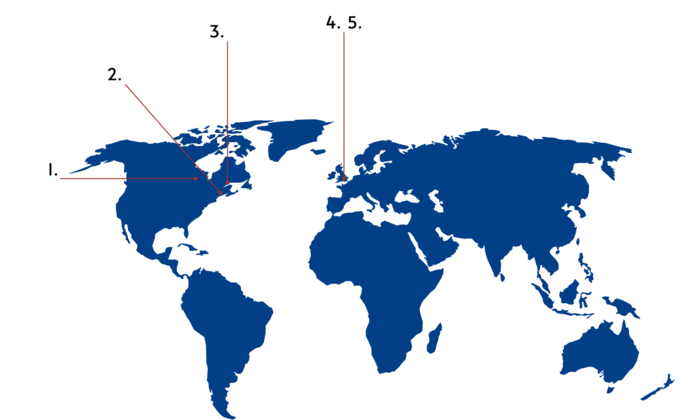Subject Area and Research Team: I. Precision oncology
Research topics
1. Novel prognostic and predictive markers for systemic therapies in childhood and adult malignancies
2. Next-generation sequencing in diagnosis and monitoring of residual disease in myeloproliferative malignancies
3. The alterations of lipid metabolism in various mailignancies
4. Genetic and epigenetic features of selected human malignancies as a tool for early cancer detection and prediction of response to chemotherapy and immunotherapy
5. Liquid biopsy in solid tumours (circulating tumour cells, circulating tumour DNA, tumour educated platelets, exosomes) for early prognosis, prediction, and monitoring of treatment response
Coordinators
| Coordinator #1 | Coordinator #2 | Coordinator #3 | |
|---|---|---|---|
| Name and surname |  |
 |
 |
| Academic degree | Prof. Dr. Habil. | Ph.D. | Dr. Habil. |
| Employment unit | Laboratory of Translational Oncology | Department of Pathomorphology | Department of Oncology & Radiotherapy |
| Polish Platform of Medical Research | Prof. Dr. Habil. Anna Żaczek | Michał Bieńkowski, Ph.D. | Dr. Habil. Marcin Skrzypski |
| anna.zaczek@gumed.edu.pl | michal.bienkowski@gumed.edu.pl | marcin.skrzypski@gumed.edu.pl | |
| Phone number | +48 58 523 63 20 | +48 58 349 37 40 | +48 58 584 45 10 |
photos Paweł Sudara/MUG
Research Team: I. Precision oncology
Team Members: I. Precision oncology (237 KB)Feel free to contact one of our coordinators to join our Research Team.
Key current projects
1. Liquid biopsy and cell free DNA for the assessment of response to treatment in patients with Hodgkin’s lymphoma
2. Clinical relevance of plasma metabolomics, educated blood platelets sequencing, tumour mutational burden and gene expression in NSCLC patients administered curative radiotherapy
3. Novel biochemical markers in predicting response to treatment in childhood acute lymphoblastic leukaemia
4. Epigenetic biomarkers for prediction of response to immunotherapy
5. Genetic features of Reed-Sternberg cells and their interplay with tumour-infiltrating macrophages in classical Hodgkin lymphoma: identification of drug resistance and disease relapse mechanisms
Key grants
| Funding agency/grant number | Title of the project | Years | |
|---|---|---|---|
| 1. | Medical Research Agency/ RAFTING-2019/ 2019/ABM/01/00060 | Radiation-free therapy for the initial treatment of good prognosis early non-bulky HL, defined by a low metabolic tumour volume and a negative interim PET after 2 chemotherapy cycles | 2021-2026 |
| 2. | The Health Research Council of New Zealand/ 18/144 | Epigenomic profiling to predict patient response to melanoma immunotherapy | 2018-2021 |
| 3. | NCBiR (1st Polish-Chinese/Chinese-Polish Joint Research) WPC1/HESCAP/2019 | Highly efficient enrichment, single-cell analysis, and drug screening of circulating tumour cells for personalized medicine | 2019-2022 |
International cooperation
| Foreign partner (unit name) | Principal investigator(s) | Area of cooperation | |
|---|---|---|---|
| 1. | Mayo Clinic; Rochester, Minnesota; USA | Fergus J. Couch | Triple-negative breast cancer (a role of BARD1 gene in the pathogenesis of TNBC) |
| 2. | Laboratory of Pathology, National Cancer Institute, Bethesda, USA | Markku Miettinen; Jerzy Lasota | Molecular characterization of sarcomas |
| 3. | Brigham and Women’s Hospital, Harvard Medical School, USA | Mariana Castells | Mastocytosis, drug allergy |
| 4. | The Francis Crick Institute, UK | Charles Swanton | Prognostic gene expression signatures for early stage NSCLC patients |
| 5. | University College London, Cancer Institute, UK | Sergio Quezada; Charles Swanton | Immunological basis of cachexia and sarcopenia in long cancer |

Key publications
1. Biswas D, Birkbak NJ, Rosenthal R, Hiley CT, Lim EL, Papp K, Boeing S, Krzystanek M, Djureinovic D, La Fleur L, Greco M, Döme B, Fillinger J, Brunnström H, Wu Y, Moore DA, Skrzypski M, Abbosh C, Litchfield K, Al Bakir M, Watkins TBK, Veeriah S, Wilson GA, Jamal-Hanjani M, Moldvay J, Botling J, Chinnaiyan AM, Micke P, Hackshaw A, Bartek J, Csabai I, Szallasi Z, Herrero J, McGranahan N, Swanton C, TRACERx Consortium; A clonal expression biomarker associates with lung cancer mortality. Nat Med. 2019; vol. 25: p. 1540-1548.
2. Lortholary O, Chandesris MO, Bulai Livideanu C, Paul C, Guillet G, Jassem E, Niedoszytko M, Barete S, Verstovsek S, Grattan C, Damaj G, Canioni D, Fraitag S, Lhermitte L, Georgin Lavialle S, Frenzel L, Afrin LB, Hanssens K, Agopian J, Gaillard R, Kinet JP, Auclair C, Mansfield C, Moussy A, Dubreuil P, Hermine O. Masitinib for treatment of severely symptomatic indolent systemic mastocytosis: a randomised, placebo-controlled, phase 3 study. Lancet. 2017; vol. 389: p. 612-620.
3. Lasota J, Chłopek M, Lamoureux J, Christiansen J, Kowalik A, Wasąg B, Felisiak-Gołąbek A, Agaimy A, Biernat W, Canzonieri V, Centonze G, Chmielik E, Daum O, Dubová M, Dziuba I, Goertz S, Góźdź S, Guttmejer-Nasierowska A, Haglund C, Hałoń A, Hartmann A, Inaguma S, Iżycka-Świeszewska E, Kaczorowski M, Kita P, Kołos M, Kopczyński J, Michal M, Milione M, Okoń K, Pęksa R, Pyzlak M, Ristimäki A, Ryś J, Szostak B, Szpor J, Szumiło J, Teresiński L, Waloszczyk P, Wejman J, Wesołowski W, Miettinen M. Colonic adenocarcinomas harboring NTRK fusion genes: A clinicopathologic and molecular genetic study of 16 cases and review of the literature. Am J Surg Pathol 2020; vol. 44: p. 162-173.
4. Nastały P, Stoupiec S, Popęda M, Smentoch J, Schlomm T, Morrissey C, Żaczek AJ, Beyer B, Tennstedt P, Graefen M, Eltze E, Maiuri P, Semjonow A, Pantel K, Brandt B, Bednarz-Knoll N. EGFR as a stable marker of prostate cancer dissemination to bones. Br J Cancer 2020; epub ahead of print; doi: 10.1038/s41416-020-01052-8.
5. Camidge DR, Dziadziuszko R, Peters S, Mok T, Noe J, Nowicka M, Gadgeel SM, Cheema P, Pavlakis N, de Marinis F, Cho BC, Zhang L, Moro-Sibilot D, Liu T, Bordogna W, Balas B, Müller B, Shaw AT. Updated Efficacy and Safety Data and Impact of the EML4-ALK Fusion Variant on the Efficacy of Alectinib in Untreated ALK-Positive Advanced Non-Small Cell Lung Cancer in the Global Phase III ALEX Study. J Thorac Oncol 2019; vol. 14: 1233-1243.